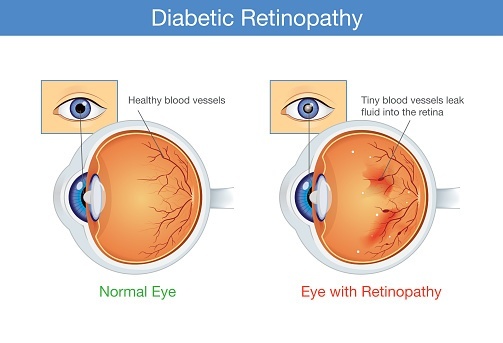By Erica Laceria on Aug 1, 2016 @ 05:30 PM
If you have diabetes, you most likely have a long list of reasons as to why you should control your blood sugar. One of those reasons could be diabetic retinopathy. If you haven't been checked for it yet, you probably will the next time you visit an ophthalmologist for an eye exam. However, what is diabetic retinopathy?
What is it?
According to the American Optometric Association, diabetic retinopathy is a result of blood sugar being out of control for too long. When your blood sugar is high for a while, you can end up with more fluid in the eye which results in blurred vision. It'll go away if you control your blood sugar, but if you don't, you can end up damaging the blood vessels and capillaries that nourish the retina (which is at the back of your eye and is the light-sensitive tissue that helps you see.)
Symptoms
So, how would you know if you have diabetic retinopathy? At first, you may have no symptoms at all which is why the AOA recommends anyone with a diabetic diagnosis (whether it be Type 1 or Type 2) be checked regularly.
Symptoms you may experience are:
- Blurry vision
- Strings or floaters in your vision
- Decreased color vision
- Fluctuations in your vision
- Dark spots in your vision
- Vision loss
The Mayo Clinic warns about the several serious complications that can result from diabetic retinopathy. Complications can include: retinal detachment (where the retina pulls completely away from the eye), glaucoma (which is pressure that can result in optic nerve damage), and blindness among others. It's very important to be checked regularly. However, what can be done once it is detected?
Treatment
After your doctor does a dilated eye exam and you've been diagnosed, what happens then? Treatment depends on the severity of the condition.
- Early- Focus will be on controlling your blood sugar, and you may be referred back to your endocrinologist to help you do that. If your blood sugar is controlled, the diabetic retinopathy will slow or stop its progress.
- Advanced- There are several surgeries that can slow or stop the progress of diabetic retinopathy at the advanced stages. Two kinds of laser surgery can be done right in the doctor's office, while a third is done in a hospital. Surgery can help, but you will still need to be checked regularly.
Diabetic retinopathy can be a scary problem, but just make sure that you have your eye exam regularly, and know that the best thing you can do is control your blood sugar to avoid this issue.





comments